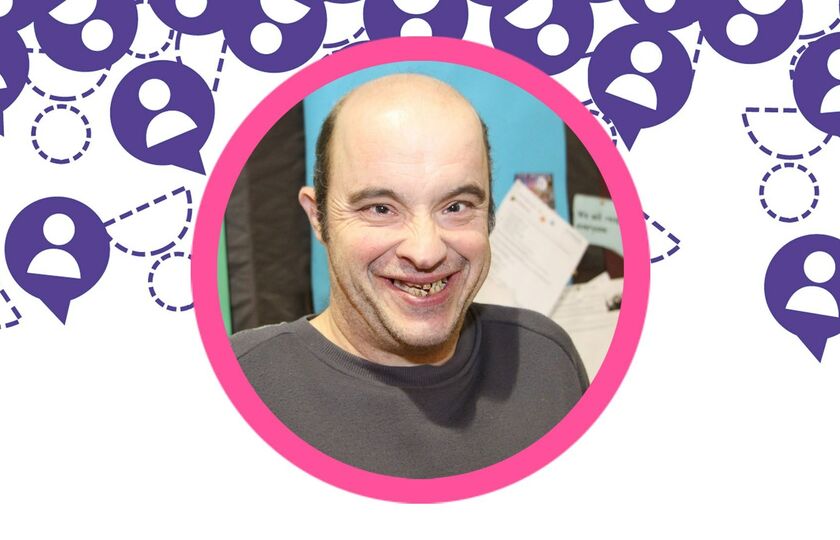Read Mencap's blog by Amy Clarke on their website (2015).
Supported Loving toolkit
Supporting people to date

People may need support prior to dating as it can cause a range of emotions from excitement to anxiety and distress.
Understanding the person’s expectations can support them emotionally, keeping them safe and helping them find the right person to date.
How best to support people
Prior to dating
Family/friends and carers should support a conversation with the person to be clear about the individual’s intentions prior to dating so that both parties are aware and there is no confusion or disappointment. People should feel they can speak to at least one person who they trust and/or involve specialist support if needed.
Expectations and conversation topics include:
- Is the person looking for a casual/social relationship, an intimate relationship and/or a long-term relationship that may lead to marriage or moving in together?
- People can be very eager and need to understand that relationships take time to develop.
- Not all relationships will be successful and a person may need to deal with a relationship breaking down, which can cause upset.
- Intimate relationships (physical contact, kissing etc) are a part of dating. A person needs to be aware of their expectations about intimate relationships and should feel they can talk to someone about it and understand they can say no if they are not comfortable.
If unwanted advances happen or continue then the best course of action would be to end the date and inform any family carer or friend to discuss what happened.
- Support the person to discuss boundaries and future relationships.
- Sexual health, relationship, pregnancy advice: a person may need assistance to access and attend educational services relating to sexual health.
It is common for parents/family carers to be concerned and be resistant to dating due to a number of factors. The person has rights as an individual to start dating if they wish. It is important that the person expresses their opinion, is honest and has support from an advocate if needed. Family/friends and carers should be consulted and we would advise you to talk any concerns you have through with them before the date.
On the date
Physical safety is important for all people when dating. The person may need support to make decisions around whether to exchange personal information and in making arrangements for the date.
- Choose an appropriate place to meet for the date e.g. meet in a public place, not in a person’s home.
- Arrange safe return travel options that meet the person’s needs.
- Ensure the person has emergency contact details or a means of contacting someone.
- Discuss the consumption of alcohol and how this may impact them during their date and safety.
- Discuss the safety of exchanging personal information. Personal information should be exchanged when the person has built up trust and feels comfortable. They might agree how often contact should be made.
On the date itself people may need support to understand situations, behaviours and/or conversations. The person should be prepared or feel supported to:
- be honest and open on the date when talking to the other person and be clear about their intentions
- express they do not feel safe or are uncomfortable at any point during the date
- end the date at any point
Following the date
Have a discussion with both parties about how they think the date went, how they felt and how they would like to proceed.
Do...
- find out the relationship status of the prospective date (are they single?) to avoid an awkward situation.
- remember safety is important. Inform family/friends and/or carers of the date details and have someone chaperone the event if the person does not feel comfortable.
- encourage the person to listen and communicate. Some people can be shy or nervous and may need support to remember to listen and ask questions. A list of prepared questions can help to facilitate this.
Don't...
- forget about the person's safety. Ensure the person understands their personal boundaries and they are supported to communicate how they are feeling about dating.
- forget the person should be supported to end the date when they want to.
- be afraid to give the person options and experience different ways of dating, including blind dates and speed dating.
Case Study
Two individuals met at a Luv2meetU event earlier the year. Luv2meetU supported them to arrange a date, providing a chaperone, support in planning the date (what to do/where to meet) and travelling support. Prior to the date we provided some advice on questions they may want to ask on the date to boost their confidence and make them feel comfortable.
During the date Luv2meetU staff initially made both people feel at ease and provided ongoing support during the date such as ensuring the conversation was flowing and any practical support they needed.
The date went well and they asked if another date could be arranged and supported, which Luv2meetU provided. The second date was successful and the man asked the woman to become his girlfriend. She said that she needed time to think and this knocked his confidence. We offered reassurance and talked it through with both individuals.
The couple exchanged mobile numbers at this stage and the relationship did blossom for a while.
Luv2meetU also supported a third date, and they only needed a small amount of support and then advised they were OK to begin dating independently.
Karen England and Sharon Kennedy from HFT and the Luv2MeetU Board of Directors
Find out more about Luv2MeetU
The views expressed in the Supported Loving toolkit are not necessarily those of Choice Support.






